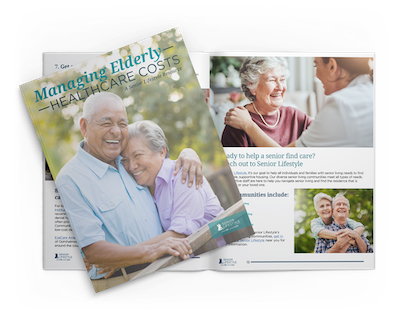As they age, seniors will find themselves facing new challenges. Physical health, mental health, costs of care and more become common issues. Another major issue for seniors is financial protection. This affects both the seniors and their caregivers.
Recent research has found that elder financial exploitation is widespread and continues to grow. This article will give caregivers and loved ones 20 tips on financial management and planning and other resources to help protect the elderly from financial abuse.
What Financial Issues Do Elders and Their Caregivers Face?
Having enough money to live on as you age is of course a key issue. Another is financial abuse – that is, being cheated out of your hard-earned money through theft, fraud, misuse of assets or credit, or by allowing somebody to gain control of your finances.
According to a recent U.S. Consumer Financial Protection Bureau report, the number of people filing reports about elder financial exploitation quadrupled from 2013 to 2017. The average amount lost was $34,200.
Elder financial abuse deprives older adults of their resources and ultimately their independence. Older people that rely on others for help or who have disabilities can be susceptible to scams and other fraud. Unfamiliar new technology can also make it difficult for seniors to stay safe and know whom to trust.
The federal report also detailed the financial risks that elders face. It said older adults faced more danger when they knew the person trying to scam them. The average financial loss per person was about $50,000 when the older adult knew the suspect and $17,000 when the suspect was a stranger.
Here are signs to look for when you suspect elder financial abuse:
- Abrupt changes in spending or saving habits
- Altered wills and trusts
- Bank statements that no longer go to the customer’s home
- Changing from a basic account to one that offers more complicated services
- Checks written as “loans” or “gifts”
- Closing accounts or certificates of deposit without considering penalties
- Confusion, fear or lack of awareness on the part of an older customer
- Excessive, sudden gift-giving
- Frequent, unusual ATM use
- Large, unexplained bank withdrawals or transfers
- Missing money or property
- New “friends” helping older people conduct bank transactions
- Odd explanations for financial activity
- Powers of attorney the older person does not understand
- Reluctance or shame and refusal to talk about the problem
- Sudden unpaid bills or insufficient funds
- Suspicious signatures or outright forgery of checks
- Uncharacteristic attempts to wire large amounts of money
- Visitors or phone calls intercepted by a fiduciary, money manager or other person
Any one of these points should be investigated to protect you or your loved one. It’s important to intervene now before it’s too late.
Here are some tips for your loved ones, and for you as their caregivers, to protect their finances.

Download The Complete Guide to Managing Elderly Healthcare Costs
One of the most impactful considerations for a senior’s quality of life is healthcare costs. Read our eBook, “The Complete Guide to Managing Elderly Healthcare Costs” for the financial insights you need to help you make an informed decision.
Download The Guide
11 Financial Tips for Your Loved Ones
There are 11 easy ways to safeguard your nest egg for your loved one as they age.
- Beware of “free money” – Never pay a fee or taxes to collect supposed sweepstakes or lottery winnings.
- Buy long-term care insurance – This insurance isn’t cheap, but it can help provide care coverage if you don’t have enough money saved.
- Don’t rush decisions – Don’t let yourself be pressured into financial decisions. Ask for details in writing and get a second opinion.
- Find someone to help – Choose a trustworthy person carefully to be your agent in all estate-planning matters.
- Hold on to personal information – Never give your Social Security number, account number or other financial information to anyone over the phone unless you initiated the call and the other party is trusted.
- Keep a paper trail – Pay with checks and credit cards instead of cash. This allows you or a caregiver to double check your purchases.
- Make a financial plan – Talk to an attorney, a financial advisor or someone at your financial institution about the best options to protect your assets and to ensure your wishes are followed.
- Monitor your credit report – The three main reporting agencies – Equifax, Experian and TransUnion – each offer a free credit report every year, so stagger them, getting one every four months.
- Protect sensitive items – Lock up your checkbook, account statements and other financial information when others will be in your home.
- Shred your paper – Destroy bank statements, receipts and unused credit card offers before throwing them away.
- Trust your instincts – Exploiters and abusers often are very skilled. If something doesn’t feel right, it may not be right. If it sounds too good to be true, it probably is.
Above all, remember that you have the right not to be threatened or intimidated. When it comes to your money, feel free to say “no.” After all, it’s your money.
If you think someone close to you is inappropriately trying to take control of your finances, call your local Adult Protective Services or tell someone at your bank.
There are several steps that caregivers should also take to protect the finances of their loved ones.
8 Financial Tips for Caregivers
Looking after an elderly loved one can be a difficult job, and health and wellness is only one part of the equation. Watching their finances is also essential. Here is how caregivers can help their loved ones with their finances.
- Claim all your tax breaks – If you take care of an aging parent or relative on your own, make sure you’re financially prepared for that responsibility. There are tax breaks for individuals who serve as caregivers. Check with your tax advisor.
- Compare care options – You might not be able to care for your loved one alone. You should meet with independent caregivers, home care agencies and home health aides. Also explore nursing homes and assisted living facilities.
- Create a power of attorney – This legal document can permit you to act on your loved one’s behalf in financial matters such as refinancing a mortgage, selling property, filing taxes and depositing or cashing checks.
- Explore government programs – Several federal programs can offer aid to make senior expenses less pricey. Walk your loved one through a Benefits Checkup at the National Council on Aging to find the right programs.
- Immediately report abuse – If you suspect that an older family member is being financially abused or is the victim of fraud, there are steps you should take. Find out details below.
- Name a trusted contact person – Many banks will let your loved one designate a trusted contact person to confirm information and address suspicious activity.
- Set up a joint account – Help your loved one by becoming a co-owner of their account so you can help manage their finances.
- Work to avoid family conflicts – One of the biggest conflicts can be familial. Siblings can find themselves bickering over the way their parents’ finances are handled. Set up family meetings to address concerns before they grow into legal battles.
What Should You Do If You Suspect Financial Abuse?
Talk to your loved ones if you suspect financial abuse. Use the signs at the beginning of this article to know what to watch out for. If you are worried that your loved one is being taken advantage of, here are a few things you can do.
- Contact Adult Protective Services in your town or state for help.
- Inform your loved one’s bank, and ask for help to stop the financial problems and prevent their recurrence.
- Report suspicious communications or transactions immediately. You can also find help in your community by using the Eldercare Locator, which is provided by the U.S. Administration on Aging.
- Tell police of any instances of elder financial abuse. If fraud is involved, they should investigate.
The Consumer Finance Protection Bureau has more ideas and resources for seniors and their financial caregivers.
Contact Us for More Information
Find out more tips and ideas for older people and what they need to know about their Senior Lifestyles. Read our blog for more information. Contact us to get answers to any questions you have about our communities.
Sources:
https://www.aarp.org/caregiving/financial-legal/info-2020/managing-someone-elses-money.html
https://www.bankofamerica.com/life-services/elder-financial-services/

